© 2020 by Wolf-Dieter Seiffert
You can find an introduction to Beethoven in feature films in our Blog.
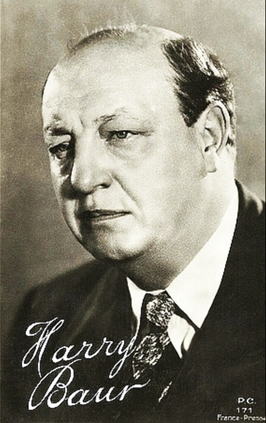
Beethoven
Title Beethoven
Subtitle --
Genre Biopic (Feature film)
Country France
Language Silent film
Director Victorin-Hippolyte Jasset
Script Victorin-Hippolyte Jasset
Actor (Beethoven) Harry Baur
Release date 1909
Duration -- (short film)
Youtube Films by Victorin-Hippolyte Jasset
IMDb Film details
Wikipedia --
DVD --
Comment
The first silent film about Beethoven. See Stummfilm-Magazin
Recommendation -- Not seen.
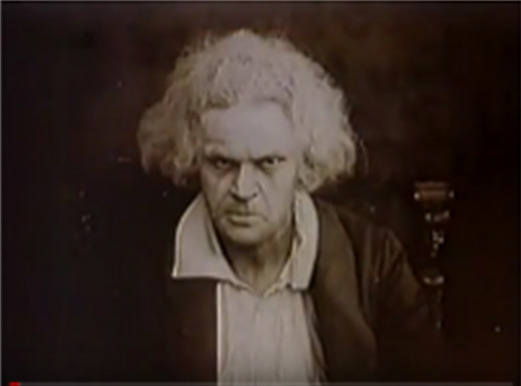
Märtyrer seines Herzens
Title Der Märtyrer seines Herzens [Martyr of His Heart]
Subtitle Beethovens Lebensroman in 5 Akten
Genre Biopic (Feature film)
Country Austria, Hungary
Language Silent film (onscreen intertitles in German)
Director Emil Justitz
Script Emil Kolberg
Actor (Beethoven) Fritz Kortner
Release date 1918
Curation ca. 60 minutes
Youtube Film (with spanish subtitles)
IMDb Film details
Wikipedia Article
DVD --
Comment
Quite worth seeing as a historical film document. Fritz Kortner as character actor in one of his starring roles – a “must”. Played are Beethoven’s life stages (in “5 acts”); fictious framework plot (with a Baron von Trautenfels) plus many details (for example, Franz Schubert at Beethoven’s deathbed). Felix Günther’s impressive continuous piano “improvisations” on Beethoven themes in the background. Many powerful scenes, for example, Beethoven, increasingly seedy, wandering around in nature and then imprisoned. (45:06 ff.)
Recommendation * * *
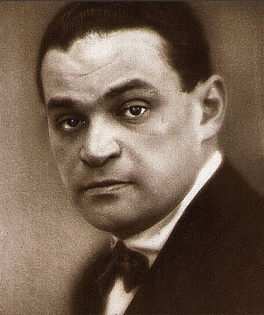
Beethoven. Das Leben des Beethoven
Title Beethoven [The Life of Beethoven]
Subtitle Das Leben des Beethoven
Genre Biopic (Feature film)
Country Austria
Language Silent film (onscreen intertitles in German)
Director Hans Otto Löwenstein
Script Emil Kolberg
Actor (Beethoven) Fritz Kortner
Release date 1927
Duration ?
Youtube --
IMDb Film details
Wikipedia Article
Information Bundeskunsthalle
DVD --
Comment
‘The occasion for this Beethoven film was the centenary of his death. The film was restored a few years ago under the direction of the restorer Dr Nikolaus Wostry of the Filmarchiv Austria. At the end of February 2020, the Thuringia Philharmonic Gotha-Eisenach will be recording a new music score for this version in the Stadthalle Gotha. After the recording sessions, the film will premiere with the new musical setting on February 29, 2020 at the Kulturhaus Gotha. A TV broadcast is scheduled for June 26, 2020.’ Source: Stummfilm-Magazin
See also: Förderverein Filmkultur
Recommendation -- Not seen.
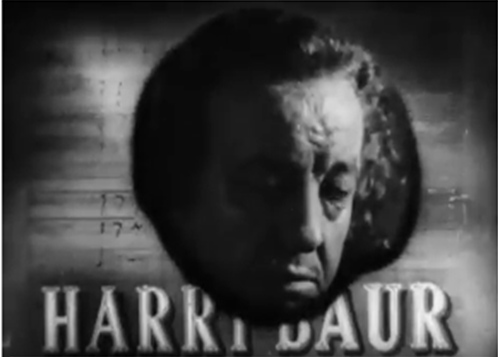
Un grand amour de Beethoven
Title Un grand amour de Beethoven
Subtitle Beethovens große Liebe
Genre Biopic (Feature film)
Country France
Language French
Director Abel Gance
Script Abel Gance
Actor (Beethoven) Harry Baur
Release date 1937
Duration ca. 120 minutes
Youtube Film (until 1:56:00)
IMDb Filmdetails
Wikipedia Article
DVD Amazon
Comment
Worth seeing more as a historical film-drama than as a Beethoven documentary, actually, almost a cult film for some Beethoven fans (repeatedly cited and quoted in later docufictions). Featured is Beethoven’s unrequited love for the Countess Giulietta Guicciardi, the alleged “Immortal Beloved”, as well as for Therese and Josefine von Brunsvik. Dramaturgy and visuals are psychologically, melodramatically, highly overheated. Some powerfully impressive scenes (created and acted): “Windmill or Storm Scene” with the 6th symphony (43:30 ff.); Death scene (with thunderstorm and “Miserere” on the “Moonlight” sonata opening: 1:53:00 ff.).
Recommendation * * *
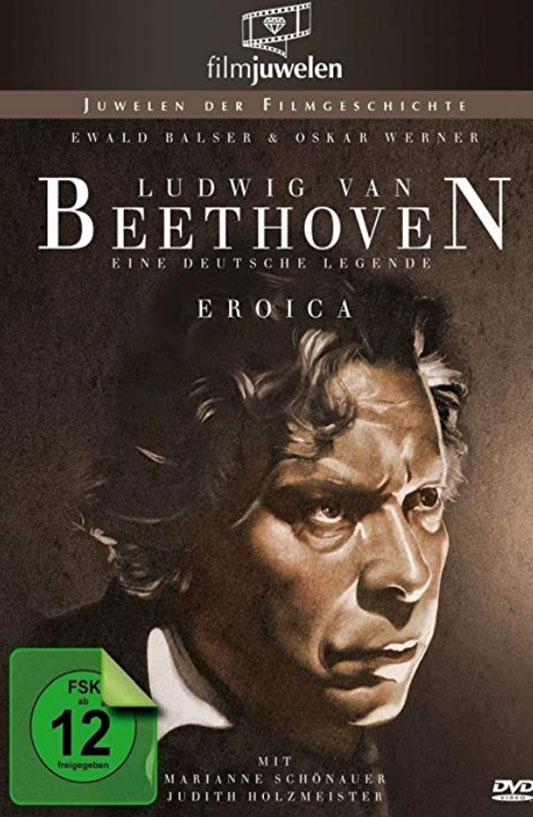
Eroica
Title Eroica
Subtitle Ein österreichischer Film um Ludwig van Beethoven
Genre Biopic (Feature film)
Country Austria
Language German
Director Hans Walter Kolm-Veltée
Script Hans Walter Kolm-Veltée
Actor (Beethoven) Ewald Balser
Release date 1949
Duration 93 minutes
Youtube Film
IMDb Film details
Wikipedia Article
DVD Amazon
Comment
Recommendable, though because of its poor sound quality, especially because of the terribly clichéd role-typing, certainly a “vintage” Beethoven movie, first of all. Compensating for the technically poor filming and sound quality and the often also dowdy and wooden staging (particularly, the ultra-conservative women’s scenes, unbearably so by today’s standards) are, however, an unsurpassed image aesthetics with magnificent, virtually painterly spatial effects (played mostly in semi-darkness - as on a theatre stage), making the film above all always a great aesthetic pleasure and visual experience even upon repeated viewings. Ewald Balser, the Vienna Burgtheater actor, amazingly Beethoven-like, confidently and calmly embodies his Beethoven. Many details are, of course, fictitious and also narrated far too “benignly” (e.g., Beethoven’s “reasonably” fending off Giulietta’s advances; or the nephew conflict that bypasses the centre of the problem). The movie is called “Eroica” solely because it opens biographically around 1803, then proceeds by (12) giant steps up to the 9th symphony (1824). The music itself (in excerpts) only sounds from offstage, usually unbearably distorted (e.g., Knappertsbusch with the Vienna Philharmonic).
Particularly powerful scenes: Beethoven’s refusal to play before Napoleon (20:55 ff.); Beethoven, playing the “Moonlight” sonata (excerpts of the 1st and 3rd movements) in front of an audience, whilst staring at Countess Giulietta Guicciardi, who is deeply shaken by his music (25:50 ff.); Beethoven’s recognition of his permanent deafness (57:25 - 1:03:43); the deaf Beethoven’s “noises” at the piano (composing the Leonore overture), unbearable for the neighbours (1:11:42 ff.).
Recommendation * *
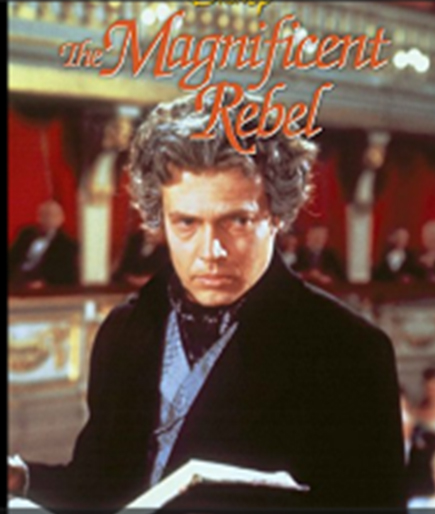
The Magnificent Rebel
Title The Magnificent Rebel
Subtitle Schicksals-Sinfonie
Genre Biopic (Feature film)
Country USA (Disney)
Language English
Director Georg Tressler
Script Joanne Court
Actor (Beethoven) Karlheinz Böhm
Release date 1961
Duration 92 minutes
Youtube Teaser
IMDb Film details
Wikipedia Article
DVD Amazon
Comment
Quotation: ‘With a wildly grimacing Karlheinz Böhm in the title role, the film became an accumulation of all conceivable clichés on the subject of “genius and deafness”, which had to do only distantly with Beethoven and would at best satisfy an American audience without prior knowledge, but could only provoke laughter in Europe.’ from: Wikipedia
Recommendation *
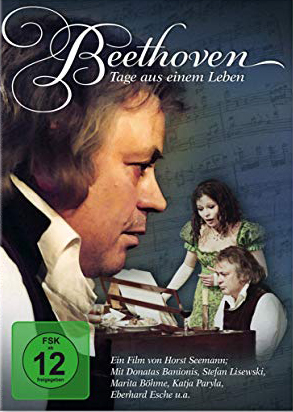
Beethoven. Tage aus einem Leben
Title Beethoven
Subtitle Tage aus einem Leben
Genre Biopic (Feature film)
Country GDR
Language German
Director Horst Seemann
Script Horst Seemann, Franz Jahrow, Günter Kuhnert
Actor (Beethoven) Donatas Banionis
Release date 1976
Duration 108 minutes
Youtube --
IMDb Film details
Wikipedia Article
DVD Amazon
Comment
A feature film worth seeing, with scenes from Beethoven’s life between 1813 and 1819. Focuses more on Beethoven’s sympathetic, “earthy” person than on his work and creativity. Much is pure fiction. Donatas Banionis occasionally plays in a very Beethoven-like makeup, he very convincingly embodies more the melancholy, grumpy, intellectual Beethoven than the irascible, coarse character otherwise presented.
The scenes are subtitled in German with subheadings like "Love of Art", "Rebellion", “Consolation in Nature”, etc. Individual scenes are rather drawn out, but this calm narrative tempo really expresses very atmospherically daily Viennese urban life (of nobility, citizens, craftsmen, beggars) and rural life (of farmers, etc.). Lots of Austrian dialect spoken. Actors, all good to excellent, and Josefine, showing up repeatedly, quite erotic as a mistress.
Too many eccentric dialogues, though, unlifelike and too overtly didactic in tone; with such platitudes as Razumovsky’s once saying to his noble companion (15:35 et seq.): “Beethoven clearly conveys to us the unity of all humankind.” And his counterpart replying: “resolved in such music is eternal salvation”. Beethoven’s love of freedom and his abhorrence of the monarchy are clearly expressed in many scenes – in a GDR [East German] film, no less! – the artist’s freedom and possible positive influence on a democratic society is held high.
Highlights are: Peter Schreier singing from the touching Goethe song “Ich komme schon durch manches Land” (op. 52/7) (approx. 28:00 ff.); the “Section: Consolation in Nature” (41:20 ff.), showing the lonely artist wandering through nature against film music using the op. 135 slow movement (in a great recording by the Suske Quartet); the dialogue with (a half-moronic) Anton Schindler on freedom and democracy (1:12:40 et seq.); the moving final scene with an impoverished Beethoven trudging behind a carriage with his few belongings through a Viennese alley, then (cut) to a busy GDR street (accompanying film music: 9th symphony, chorus, and op. 13, 2nd movement).
Recommendation * *
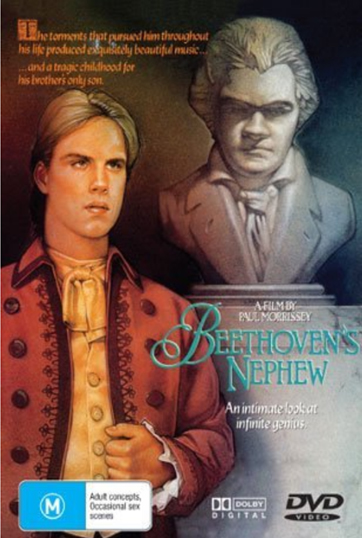
Beethoven. Die ganze Wahrheit
Title Beethoven. Die ganze Wahrheit
Subtitle Beethoven's Nephew
Genre Biopic (Feature film)
Country France-Germany
Language German, English
Director Paul Morrissey
Script Mathieu Carrière, Paul Morrissey
Actor (Beethoven) Wolfgang Reichmann
Release date 1985
Duration 105 minutes
Youtube Excerpt
IMDb Film details
Wikipedia Article
DVD Film
Comment
A movie that sets out to demystify and unmask the Beethoven persona, dealing mainly and extremely pointedly with the well-known “nephew-conflict” (custody of his late brother Caspar’s son Karl, whose mother, and Caspar’s widow, Beethoven considered a whore). The “whole truth” is said to be that the old Beethoven, who had been suffering from syphilis for years, loved his nephew Karl obsessively, even morbidly, jealously, and finally drove him to attempt suicide. Karl, in turn, took revenge on his terminally ill uncle by fetching a doctor far too late. Wolfgang Reichmann plays a choleric, irascible, highly emotional character. All dialogues seem wooden and insincere. Apart from that, the film is too long and is also dramaturgically very unbalanced (e.g., a motiveless, far too lengthy scene on the world premiere of the 9th symphony). A rightly forgotten, virtually out of print movie, even as a DVD.
Recommendation *
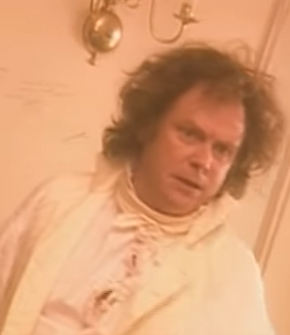
Beethoven lives upstairs
Title Beethoven Lives Upstairs
Subtitle --
Genre Biopic (Feature films) (children's film)
Country Canada
Language English
Director David Devine
Script Heather Conkie
Actor (Beethoven) Neil Munro
Release date 1992
Duration ca. 50 minutes
Youtube Film (with greek subtitles)
IMDb Film details
Wikipedia Article
DVD Film
Comment
A fiction, worth seeing, and touching from the viewpoint of a boy who has just lost his father (who, in turn, allegedly invented Beethoven’s ear trumpet). The choleric, but also delicately sensitive and deaf Beethoven moves into the boy’s house. Initial rejection grows into admiration. Beethoven is impressively played - even for adults - by Neil Munro, whilst the supporting roles are also all very well cast, including the temperamental maid. Lots of music is heard in both the foreground and background. The boy’s mother (a piano teacher) plays “Für Elise”, and while Beethoven is working on the composition of his 9th symphony, the boy admires him to the utmost (“it was all in his head!”). The film is said to be used in schools in English-speaking countries; rightly so.
Recommendation * * *
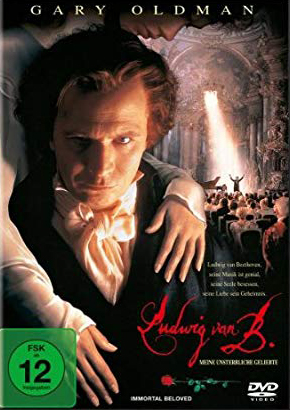
Ludwig van B.
Title Ludwig van B.
Subtitle Immortal Beloved
Genre Biopic (Feature film)
Country UK, USA
Language Englisch
Director Bernard Rose
Script Bernard Rose
Actor (Beethoven) Gary Oldman
Release date 1994
Duration ca. 116 minutes
Youtube Trailer
IMDb Film details
Wikipedia Article
DVD Amazon
Comment
Beethoven movie, opulently staged, beautifully filmed in lovely places, with great actors. Gary Oldman plays a multifaceted, consistently convincing Beethoven: from extreme delicacy and self-absorption to the brutal violent man. The music was produced especially for the film, Sir Georg Solti conducting, Murray Perahia at the piano.
The narrative trick is that Anton Schindler, as will executor, is seeking the “Immortal Beloved”, for Beethoven bequeathed everything to her, not to his nephew Karl. In search of the one unidentified, he visits some of the noble ladies already known from the biography (the Brunsvik sisters, Giulietta Guicciardi, Anna Marie Erdödy – though not Antonie Brentano), researches original locations (Karlsbad, Schloss Erdödy, etc.), and so Beethoven’s Viennese period is played out in narrated retrospectives from about 1803 until his death. In particular, the “nephew conflict”, including court hearings and suicide attempts takes up a lot of space. Although all these ladies (in the film) had a relationship with Beethoven, none of them wanted to be the addressee of the famous letter. Until Schindler finds out towards the end of the film to his (and our) surprise that Johanna van Beethoven, Ludwig’s only seemingly despised sister-in-law (“whore”), was his lover and "Immortal Beloved", he himself, of course, being also Karl’s actual father. This surprising volte is construed contrary to all facts, just like many other of the film’s details (e.g., there is a debate between Metternich and Beethoven), yet the plot is surprisingly convincing.
In order, presumably, to become a real hit, many scenes have had (unnecessarily) to be “laid on thick”: Always quite a lot of bare skin being seen in unambiguous scenes; a rough brawl between the Beethoven brothers ending with a tubercular Caspar horribly spitting blood; Beethoven riding in a gallop with soldiers to his brother Caspar’s house, only to be actually dragging his nude brother and sister-in-law out of bed during their midday nap (37:45 ff.). In retrospect, Beethoven relives the trauma of his brutally castigating, drunken father; Beethoven, drunk himself and frantic, is kicked by Viennese guttersnipes and eventually falls asleep on the stone pavement. Napoleonic army atrocities are shown, including a rape, and the Comtessa Erdödy’s young son dies in the castle during deafening gunfire, etc. But there are also many emotionally moving, magnificent scenes that give this movie its enduring grandeur, with the music/image combo being especially successful.
Only a few scenes to be highlighted: Beethoven rehearsing, his ear pressed to the instrument, a Broadwood piano at Giulietta’s – she, who had promised him that he was all alone – whilst in fact, she and her father were hiding behind a wall to find out if he actually was deaf (30:45 ff., with, of course, the “Moonlight” sonata); world-premiere disaster with the 5th piano concerto, which Beethoven has to break-off because as a conductor he can’t hear a thing (Gary Oldman as “pianist” is fabulous); Anna Marie Erdödy (beautiful Isabella Rosselini) saves the situation; following the 5th piano concerto’s slow, heartbreaking movement, her (Rosselini’s) “knowing” glances to this music are harrowing (41:40 et seq.); the movie’s climax is, however, undoubtedly the world premiere of the 9th symphony, during which the deaf Beethoven experiences final liberation from his despotic father; Bernard Rose (director and scriptwriter) has found beguiling pictures for this (1:32:00 ff.). Very good Beethoven film, “laid-on” a bit too “thick”, with many powerful scenes, “too powerful” sometimes for me.
Recommendation * * * *
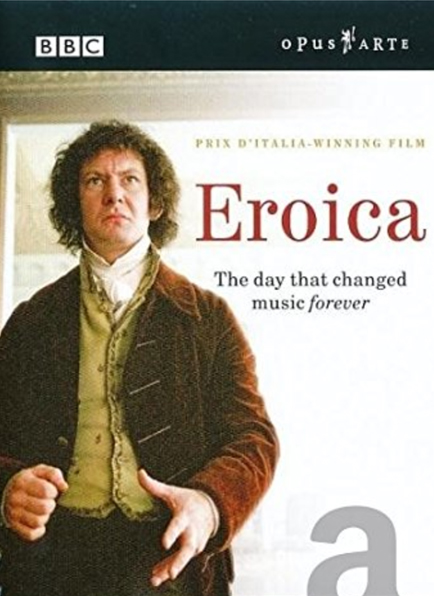
Eroica. 9 June 1804
Title Eroica. 9 June 1804
Subtitle The day that changed music forever
Genre Biopic (Feature film)
Country UK (BBC 4)
Language English
Director Simon Cellan Jones
Script Nick Dear
Actor (Beethoven) Ian Hart
Release date 2003
Duration ca. 80 minutes
Youtube Film (with German subtitles)
IMDb Film details
Wikipedia Article
DVD Amazon
Comment
The real stars of the film are the orchestral musicians who musically and gesturally “re-enact” admirably the private premiere of the “Eroica” in Prince Lobkowitz’s Viennese city palace. This event took place indeed, namely June 9, 1804. The framework plot is rather silly, and Ian Hart is miscast as Beethoven the “Rockstar” (not to mention his incompetence as a “conductor”). Reflected in the faces of those present is the whole panorama of feelings from rapture to annoyed rejection, upon listening to this very extraordinary music. But when Joseph Haydn (from 1:03:00) appears in person, the truly revolutionary of the “Eroica” becomes evident, thanks both to Haydn’s shock and ultimately to his rejection of what has been heard.
Amongst the most valuable, so far, of the biographical films (biopic) about Beethoven.
Recommendation * * * *
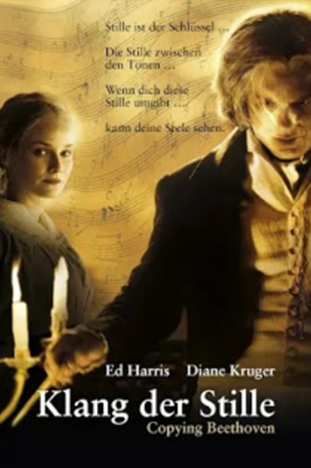
Copying Beethoven
Title Copying Beethoven
Subtitle Klang der Stille
Genre Biopic (Feature film)
Country USA
Language English
Director Agnieszka Holland
Script Stephen J. Rivele and Christopher Wilkinson
Actor (Beethoven) Ed Harris (Diane Krueger as “Anna Holtz”)
Release date 2006
Duration ca. 100 minutes
IMDb Film details
Wikipedia Article
DVD Amazon
Comment
The completely fictional plot – “at the last minute”, 23-year-old music student Anna Holtz copies for Beethoven the parts material of the 4th movement for the premiere of his 9th symphony, conducts its successful premiere “for” him who is deaf, and is finally recognised by him as a “promising” composer; this movie works mainly because of the great images (shot at various locations in Hungary and in the studio), because of the convincing dialogues and because of the good main actors. Heard in addition to the 9th symphony (from 55:10 ) for a good 10 minutes of truncated performance (thereafter, the famous passage with the deaf Beethoven, who has to be turned around to view his audience clapping enthusiastically), the late string quartets and the “Great Fugue” also play a central role.
In its aesthetic of beautiful, painterly settings with its many baroque light/dark contrasts, the film is strongly reminiscent of Hans Walter Kolm-Veltée’s 1949 “Eroica” movie (see above), – here, of course, in color and splendid stereo sound.
Beethoven is drawn as a moderately choleric, very masculine-authoritarian character; the nephew conflict is well implied, though not dominating; Beethoven is furthermore portrayed as a believer, to whom God sends the music into his silence (deafness): “Solitariness is my religion” (46:45ff., and especially 48:36-50:00). The subtitle “Copying Beethoven” means not only the mechanical activity of writing notes, but also the compositional style into which Anna takes refuge near the master (1:26:09): “The world does not need another Beethoven, but maybe you”...
Powerful scenes: op. 131/7 as background music for Beethoven’s liberation of Anna from the cloister (1:15:05 ff.); the “Great Fugue” as a bridge into the new world of music (not understood, the premiere audience all leave the room, then Beethoven collapses, 1:28:00 ff.); marked by illness, Beethoven dictates the “Heilige Dankgesang eines Genesenen an die Gottheit, in der lidischen Tonart [A Convalescent’s Holy Song of Thanksgiving to the Deity, in the Lydian Mode]” op. 132/3, explaining the music, in great illumination of the scene (1:32:10 ff.).
The 9th is used in Haitink’s recording with the Concertgebouw, the string quartet recordings come from the phenomenal “Takacs Quartet”.
A beautiful film, empathetic, ready for a mass audience. In fact, the only Beethoven movie shot so far that one should definitely have seen.
Recommendation * * * * *
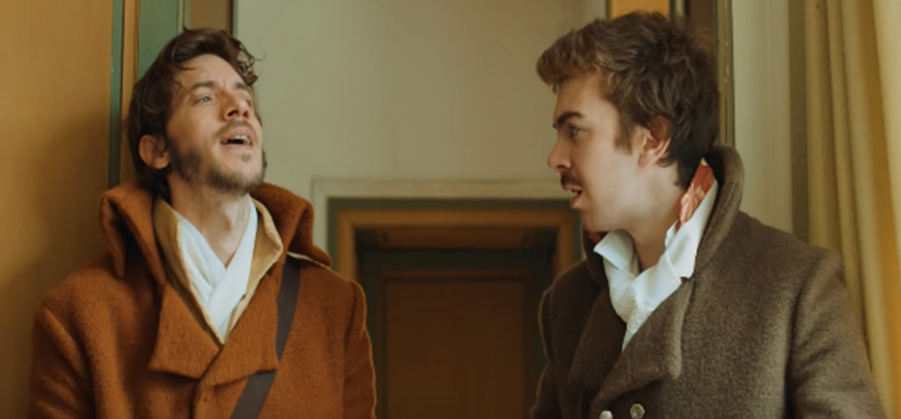
Beethoven L'éternel - Le Film
Title Beethoven L'éternel - Le Film
Subtitle --
Genre Biopic (Feature film)
Country France
Language French
Director Avner Peres
Script Avner Peres
Actor (Beethoven) Avner Peres
Release date 2018
Duration ca. 50 minutes
Youtube Film [from 00:1:00], Making of
IMDb Film details
Wikipedia --
DVD --
Comment
Two young, 21st-century Frenchmen travel with a time machine directly into Beethoven’s life around 1803 (in Beethoven period costumes). The movie’s real trick: the one young man (“Comte de Monte Christo”) performs on his piano the opening of Beethoven’s “Moonlight” sonata, a work that for his part Beethoven had not yet even composed, and which deeply moves Beethoven. At the end of the movie (48:00 ff.), when the two of them return to our time, Beethoven then composes the work “to the end”.
All the actors do their best to turn the moderately funny plot into something meaningful (i.e., to represent biographical details and artistic significance). Not only do the two Frenchmen travel into Beethoven’s time, to experience, for example, the separation of Giulietta Guicciardi and Beethoven, or the beginning of the master’s deafness (whose immortality they predict when he bids farewell - see the movie title), but here and there Beethoven himself also recalls his youth; the scene in the parents’ house is powerful, as are those scenes with Joseph Haydn. The Haydn scene (18:05 – 20:25) is especially worth seeing. There is also no shortage of comic scenes, such as the brief appearance of the “Comte” during the crucial house concert scene, where he sings a late Beatles song to the laughter of those present. The film presumably “works” in student circles. It doesn’t convince me.
Recommendation *
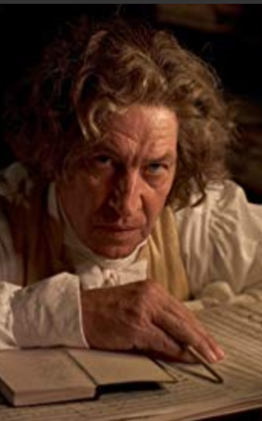
Louis van Beethoven
Title Louis van Beethoven
Subtitle --
Genre Biopic (Feature film)
Country Germany and Austria (WDR/ORF/EIKON Media)
Language German
Director Niki Stein
Script Niki Stein
Actor (Beethoven) Colin Pütz & Anselm Bresgott & Tobias Moretti
Release date 2020 (not yet released)
Duration --
Youtube Trailer
IMDb Film details
Wikipedia --
DVD --
Comment
No commentary is possible; the movie has not yet been released. See, though: INFO (FAZ)
Recommendation -- Not seen.

